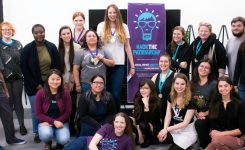Blog, Hackathon Info
The History of Hackathons: A Celebration of Code
June 30, 2016 - Blog, Hackathon Info
The term “hackathon” has most likely been in informal use since the word “hacking” was coined. But in terms of official events with the “hackathon” label, the first on record was the OpenBSD Hackathon of 1999.
This gathering didn’t have much of a formal structure, as it was really more about a group of American developers side-stepping export regulations. The event must have been fun (or at least very productive), however, since it spawned an annual invitation-only series that switched focus to freeform OpenBSD coding. Sun also used the term for an event at the JavaOne conference that same year shortly after the OpenBSD event took place.
While there’s still no formal structure to (or even specific dictionary definition of) a hackathon, their increasing popularity over the past decade has led to at least something of a standardized format. They’re usually organized around a central theme — game development for a particular platform, work on an open-source project, developing apps, or even a particular intersection of science and tech such as bioinformatics. Things kick off with some presentations, maybe some workshops. Then the participants are turned loose to code amongst themselves, often organized into groups by their areas of expertise.
A few interesting branches of the hackathon have been emerging in the last few years. One is the socially-focused or charitable hackathon, such as the annual NHS Hackaday and Random Hacks of Kindness. Another is the company-sponsored hackathon, held internally for employees by major tech players like Google, Facebook, Microsoft and Netflix. And some are demographically inclusive, like the hackathons hosted by the Meera Kaul Foundation that focus on increased representation of women in the STEM fields. Whatever the form it’s packaged in, the hackathon is ultimately a celebration of code, and an excuse for techies to get together and geek out in an environment resembling a cross between a college LAN party and a sleepover while still creating something productive (or at least interesting.) Beginners who are interested in the idea but aren’t sure where to start might want to check out CodeDay, a regular event held in cities throughout the United States that welcomes newcomers in all different fields.





